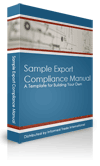There are numerous provisions in the ITAR that carve out exemptions for specific persons and entities to reduce the administrative burden of having to register as a broker (and subsequently obtain an approval for brokering activities). US Connection Predecessor to Registration Broker registration requirements require substantial links to the United States. They apply only […]
Posted on October 7th, 2016 by admin
Filed under: ITAR | Comments Off on Exemptions from the Registration Requirement
Here’s a list of ITAR exemptions that may apply to your product. Please note the date of this article when using the table. DDTC ITAR Exemption Codes Code Description 123.4A1 22 CFR 123.4 (a) (1) Temporary import of U. S. – origin defense items for servicing, inspection, testing, calibration, repair, overhaul, reconditioning, or one-to-one replacement […]
Posted on March 1st, 2012 by admin
Filed under: ITAR | Comments Off on ITAR Exemption Codes
Authorizations to transfer defense articles and provide defense services can help meet the legitimate needs of friendly countries. However, the U.S. strictly regulates exports and re-exports of defense items and technologies to protect its national interests and peace and security of the broader international community. There are 60 exemptions established in the International Traffic and […]
Posted on July 11th, 2011 by admin
Filed under: ITAR | Comments Off on ITAR Export Exemptions
The US Department of State has amended the International Traffic in Arms Regulations (ITAR) to create a new exemption for intra-company transfers that involve dual or third-country nationals. This is in response to last year’s proposed rule to eliminate the separate licensing requirement for dual national and third-country nationals employed by licensed end-users. The comments […]
Posted on May 19th, 2011 by admin
Filed under: ITAR | Comments Off on New ITAR Exemption: Dual Nationals and Third-Country Nationals Employed by End-Users
From ExportLawBlog:Â An article on the CTV website today revealed that Canada is considering a change in its Export and Import Permits Act to permit exempt imports and exports by law enforcement officers when they cross the U.S.-Canada border in the course of their official duties. Significantly this is said to be part of a reciprocal […]
Posted on July 9th, 2007 by keeton
Filed under: Canada, News | Comments Off on New ITAR Firearms Export Exemption in the Works
Exportation of defense articles and related technical data is key to the furtherance of various national security and diplomatic objectives, and as such, the United States allows exporters to sell, transfer, and otherwise protected defense articles (subject to regulatory controls) to foreign purchasers. The International Traffic in Arms Regulations (ITAR) — administered by the […]
Posted on March 7th, 2017 by admin
Filed under: ITAR | Comments Off on ITAR Marketing and Pre-sale Activity Regulation
Once a broker has been registered, there are numerous additional requirements in order to maintain their status as a registered broker. Material Changes Must Be Reported When there have been changes to the circumstances such that the registration is materially affected (the details of brokering activity have changed) then the DDTC will have to […]
Posted on October 7th, 2016 by admin
Filed under: ITAR | Comments Off on Broker Registration Renewal and Reporting
The final rules issued by the BIS and State Department – and effective as of November 2016 – alter the text of the existing EAR and ITAR regulations to better harmonize their separate DCS requirements. Commercial invoice only. The new rules no longer require a DCS on several different export control documents. Instead, under […]
Posted on September 1st, 2016 by admin
Filed under: EAR, ITAR | Comments Off on Changes Made to Harmonize the DCS provisions
Under ITAR section 122.1(a), an arms exporter must first register with the DDTC and receive State Department approval of their license application. Registration is a pre-requisite for licensing, and approval of the license application entitles the would-be arms exporter to important export privileges. Additional registration requirements and exemptions Under ITAR section 120.25, an arms exporter-applicant […]
Posted on August 8th, 2016 by admin
Filed under: ITAR | Comments Off on Licensing and Registration
The U.S. Government views the sale, export, and re-transfer of defense articles and defense services as an integral part of safeguarding U.S. national security and furthering U.S. foreign policy objectives. The Directorate of Defense Trade Controls (DDTC), in accordance with 22 U.S.C. 2778-2780 of the Arms Export Control Act (AECA) and the International Traffic in […]
Posted on June 14th, 2011 by admin
Filed under: ITAR | Comments Off on Export License Requirements


